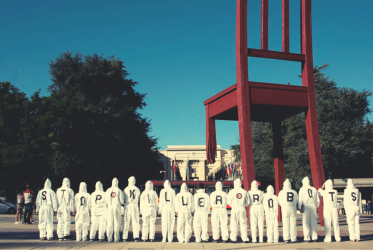Comments by Peter Weiderud, Director, CCIA, 7 October, 2005
Awarding the 2005 Nobel Peace Prize to Mohamed El Baradei and the International
Atomic Energy Agency (IAEA) honours an institutional contribution to peace,
and makes timely affirmation that even in deep crises, multilateral, legal and
peaceable conduct of international affairs is not only possible but productive.
The IAEA and its director receive this honour as agents of international law and
stewards of collective security. Using carefully mandated inspections, the IAEA
was verifying that Iraq was not a nuclear threat when a pre-emptive invasion
ended their measured approach. In Iran and elsewhere, the IAEA continues to
show that treaties and inspections can still work despite serious erosion of certain
nations' commitments to nuclear non-proliferation and disarmament.
Since the dawn of the nuclear age, the World Council of Churches has held that
elimination and prohibition of nuclear weapons are the only sure protection against
nuclear war, and that verification, which the IAEA represents, is the instrument
necessary for a nuclear weapons-free world.
The control of nuclear arms and technology is an unequivocal undertaking on the
world's agenda. It is also an incontrovertible recognition of the God-given value
of human life. With this award, the Nobel Committee in Oslo has made an important
investment in hope as well as peace.


